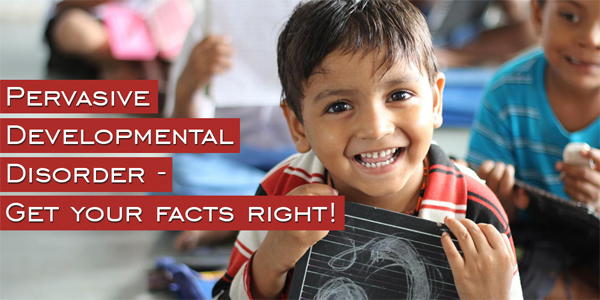It is extremely traumatizing for any parent to hear that their child has a disability . For many, this information comes as a sudden shock, so much so that they lose the ability to think clearly. In an attempt to cope with their own pain and frustrations, parents often end up ignoring the special needs of their child. With result-oriented, comprehensive care people with developmental disabilities can be more active, productive, and independent.
The early years of a child’s life are very important for his/her overall health and development. Developmental disorders are a group of childhood neurological conditions that develop over time and cause impairment in mental, emotional, behavioral, and physical features.
One such form of disability also known as the Pervasive developmental disorder (PDD) impedes an individual’s ability to develop normal communication and socialization skills. Autism , Rett Syndrome, Childhood disintegrative disorder and Asperger syndrome are all categorized as a form of Pervasive developmental disorder (PDD). Although this illness doesn’t physically affect an individual, it does have a significant impact on his/her behavior.
Symptoms
In order to commence with the treatment, it is extremely important for family & relatives to spot the warning signs of this developmental disability. Common symptoms associated with a PDD include:
- Recurring behavior or body movements (For Ex – rocking back and forth)
- Difficulty in comprehending language and speech development
- Inability to deal changes in daily routine
- Difficulty in adjusting in a new surrounding
- Inability to relate to people, normal tasks, and objects
- Strange behavior with regard to objects and toys
Diagnosis
If monitored closely, a child’s behavior can give several clues about his/her physical & psychological condition. Although, the symptoms of a pervasive developmental disorder become visible right from infancy, they are often overlooked due to ignorance and lack of awareness about the same. This developmental disability can strike from birth or any time before the child turns 3. Accurate diagnoses could be a tricky task as the assessment is based on behavioral analysis rather than medical tests. A pervasive developmental disorder therefore has to be diagnosed only by a qualified specialist.
Treatment
There is no permanent cure for a Pervasive Developmental Disorder however medications can be extremely helpful in coping with some of the behavioral problems associated with it. In addition to medication, a specialized therapy will further benefit the individual in developing some social skills
Those diagnosed with this disability almost always have a normal mental function with few even demonstrating a high intelligence quotient (IQ). With comprehensive care and medical assistance, children with disorders can function reasonably well in a normal school setting while others may have to opt for specialized teaching, which caters to their needs
If your child is diagnosed with Pervasive Developmental Disorder , it is not the end of the world. With continued progression in the world of science & medicine, there is no reason why an individual with this disability cannot live a normal life in the near future. As a parent, you know your child better enough to gauge if he/she is or isn’t showing age-appropriate behavior. If you’re concerned that your child has developmental delay, don’t hesitate to share your doubts with an expert healthcare provider
The Department of Developmental Disorders at Kokilaben Dhirubhai Ambani Hospital takes a multi-disciplinary approach that is aimed at early & accurate diagnosis, followed by personalized medical and therapeutic care.
To know more, visit:
https://www.kokilabenhospital.com/departments/clinicaldepartments/developmentdisorders.html


